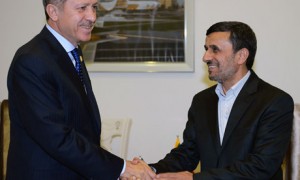 When Iranian President Mahmoud Ahmedinejad visited Turkey in August 2008, he was warmly welcomed not only by the Turkish government but by groups of Turkish Islamists. Among the latter, many held a positive image of the Islamic Republic as a bold Muslim power that dares to defy the West and supports the Palestinian resistance. When the Ahmedinejad visited the historic Sultanahmed Mosque in Istanbul for his prayers, he was greeted by a sympathetic crowd chanting “Allahu Akbar” and “Mujahid Ahmedinejad.”
When Iranian President Mahmoud Ahmedinejad visited Turkey in August 2008, he was warmly welcomed not only by the Turkish government but by groups of Turkish Islamists. Among the latter, many held a positive image of the Islamic Republic as a bold Muslim power that dares to defy the West and supports the Palestinian resistance. When the Ahmedinejad visited the historic Sultanahmed Mosque in Istanbul for his prayers, he was greeted by a sympathetic crowd chanting “Allahu Akbar” and “Mujahid Ahmedinejad.”
However, if Ahmedinejad or other top Iranian official were to visit Turkey these days, they wouldn't be likely to find another love fest. Iran's image has dramatically deteriorated in Turkey over the past two years — and not only among secular Turks, who always disliked the Islamic Republic, but also among Islamic Turks who accuse their eastern neighbor of hypocrisy.
The main reason for this shift is Iran’s policy towards Syria. The majority of Turkey’s Islamic camp — a category that includes both political Islamists and religious conservatives — see the regime of Bashar al-Assad as a brutal tyranny that slaughters its own people. Meanwhile, the same Turks perceive the Syrian opposition as the rightful defender of the oppressed. Iran, by contrast, acts totally against this vision, and gives its full support to the Assad regime while denouncing the Syrian opposition as “terrorists.”
Moreover, many Turks believe that although Turkey has gone out of its way to help Iran in regards to the West — such as Turkey's “no” vote on sanctions against Iran at the United Nations Security Council in May 2010 — Ankara has received only enmity from Tehran of late.
The resulting anger towards Iran is likely felt in governmental circles as well, although Prime Minister Recep Tayyip Erdogan and his team have been careful to avoid using negative language. But in Turkish newspapers that are generally supportive of the Erdogan government, many commentators do not mince words. For example, Mustafa Özcan, a veteran foreign policy pundit writing for Yeni Vakit, a hardcore Islamist paper, condemns what he calls “Iran’s shamelessness.” Arguing that after Khomeini “Iran is heading full swing to Safawism,” or the anti-Ottoman policy of a medieval Iranian dynasty, Özcan states: “Iran has become the number one enemy of Turkey during the Arab Spring and its Syrian phase. This is despite the fact that Turkey has acted as a protector of Iran in international settings. Regardless, Iran threatens Turkey almost every day. She betrays her friend.”
“Why is Iran like that?” Özcan asks. He offers an essentialist answer: “Because that is Iran’s chemistry, and it cannot do anything different.”
Similar comments can be found in another prominent Islamist daily, Yeni ?afak. One of the paper’s regular columnists, Veysi Ate?, in a piece entitled, “This is a disgrace, Iran,” argues that Tehran’s hostile reaction to the installment of NATO-sponsored Patriot missiles on Turkey’s Syrian border is hypocritical. He says that it is in fact Turkey that should feel threatened by Iran’s Shahab missiles — which unlike the Patriots are offensive weapons.
Writing for daily Star, a newspaper with clear pro-Erdogan sympathies, Islamist writer-activist Hakan Albayrak also condemns Iran. In a heated piece titled “God damn these red lines,” he denounces Ali Akbar Velayati, a senior aide to Supreme Leader Ayatollah Ali Khamenei, who said that Assad’s overthrow is a “red line” for Iran. Albayrak asks how Iran can see the Assad regime as the oppressed (mustadafin), while considering “women and children being bombed while waiting for bread” as the oppressor (mustakbirin).
Such comments have become common in the pro-Islamic Turkish media, as Iran’s support for the Assad regime becomes more and more reviled. While some of the critics seem to have a Sunni bias against Iran’s Shiite identity, the majority tries to avoid a sectarian tone. The common view is that Iran is blindly sectarian in the Middle East, supporting its Shiite (or even Shiite-lite) allies at the expense of innocent lives and unity of Muslims.
To be sure, some Turkish Islamists tend to see the Syrian civil war through a lens similar to Iran's, but they represent a small minority. Their political vision, which regards every problem in the Middle East as a Western-Zionist conspiracy, echoes in the marginal Felicity (Saadet) Party, which received only 1.2 percent of the votes in the general elections of 2011. This party, which was once led by the late Necmeddin Erbakan, is a relic from the old-school Islamism that Erdogan and his team parted from in the late 1990s. Its leader, Mustafa Kamalak, joined a “Syrian National Dialogue” meeting in Tehran in November 2012, in which he opposed “foreign invention” in Syria.
In the eyes of the majority of Turkey’s Islamists, however, the romantic image that Iran once had as “the defender of oppressed Muslims” is long gone. Some now see it as a fanatic Shiite force that threatens the Sunni Muslim world. Others, perhaps more accurately, consider it just an ordinary nation-state whose strategic interests override the values it claims to uphold.
By Al-Monitor
The Iran Project is not responsible for the content of quoted articles.

 QR code
QR code